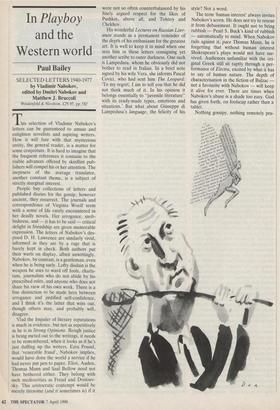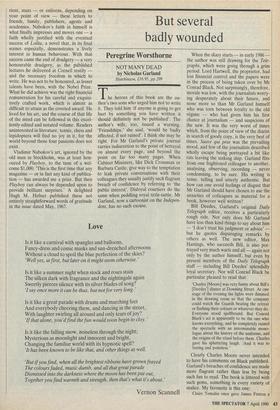In Playboy
and the Western world
Paul Bailey
SELECTED LETTERS 1940-1977 by Vladimir Nabokov, edited by Dmitri Nabokov and Matthew J. Bruccoli Weidenfeld & Nicolson, f29.95, pp.582 This selection of Vladimir Nabokov's letters can be guaranteed to amuse and enlighten novelists and aspiring writers. How it will fare with that mysterious entity, the general reader, is a matter for some conjecture. It is hard to imagine that the frequent references it contains to the risible advances offered by skinflint pub- lishers will compel his or her attention. The ineptness of the average translator, another constant theme, is a subject of strictly marginal interest.
People buy collections of letters and published diaries for the gossip, however ancient, they resurrect. The journals and correspondence of Virginia Woolf teem with a sense of life rarely encountered in her deadly novels. Her arrogance, snob- bishness, and — it has to be said — critical delight in friendship are given memorable expression. The letters of Nabokov's des- pised D. H. Lawrence are similarly vivid, informed as they are by a rage that is barely kept in check. Both authors put their warts on display, albeit unwittingly. Nabokov, by contrast, is a gentleman, even when he is being surly. Lofty disdain is the weapon he uses to ward off fools, charla- tans, journalists who do not abide by his prescribed rules, and anyone who does not share his view of his own work. There is a fine distinction to be made here between arrogance and justified self-confidence, and I think it's the latter that wins out, though others may, and probably will, disagree.
Vlad the Impaler of literary reputations is much in evidence, but not as repetitively as he is in Strong Opinions. Rough justice is being meted out to the writings, it needs to be remembered, when it looks as if he's just duffing up the writers. Ezra Pound, that 'venerable fraud', Nabokov implies, would have done the world a service if he had never put pen to paper. Eliot, Auden, Thomas Mann and Saul Bellow need not have bothered either. They belong with such mediocrities as Freud and Dostoev- sky. This aristocratic contempt would be merely tiresome (and it sometimes is) if it were not so often counterbalanced by his finely argued respect for the likes of Pushkin, above all, and Tolstoy and Chekhov.
His wonderful Lectures on Russian Liter- ature stands as a permanent reminder of the depth of his enthusiasm for the greatest art. It is well to keep it in mind when one sees him in these letters consigning yet another scribe to outer darkness. One such is Lampedusa, whom he obviously did not bother to read in Italian. In a brief note signed by his wife Vera, she informs Pascal Covici, who had sent him The Leopard: `To my regret, I am to tell you that he did not think much of it. In his opinion it belongs essentially to "juvenile literature" with its ready-made types, emotions and situations.' But what about Giuseppe di Lampedusa's language, the felicity of his style? Not a word.
The term 'human interest' always invites Nabokov's scorn. He does not try to rescue it from debasement. It ought not to bring rubbish — Pearl S. Buck's kind of rubbish — automatically to mind. When Nabokov rails against it, pace Thomas Mann, he is forgetting that without human interest Shakespeare's plays would not have sur- vived. Audiences unfamiliar with the ori- ginal Greek still sit raptly through a per- formance of Electra, excited by what it has to say of human nature. The depth of characterisation in the fiction of Balzac not a favourite with Nabokov — will keep it alive for ever. There are times when Nabokov's abuse is a shade too easy. God has given forth, on foolscap rather than a tablet.
Nothing gossipy, nothing remotely pru- rient, mars — or enlivens, depending on your point of view — these letters to friends, family, publishers, agents and academics. Nabokov's faith in himself is what finally impresses and moves one — a faith wholly justified with the eventual success of Lolita, a novel that, in its final scenes especially, demonstrates a lively interest in human behaviour. With that success came the end of drudgery — a very honourable drudgery, as the published lectures he delivered at Cornell testify and the necessary freedom in which to write. He was not to be honoured, as lesser talents have been, with the Nobel Prize. What he did achieve was the right financial remuneration for his careful and exquisi- tively crafted work, which is almost as difficult to attain as the coveted award. He lived for his art, and the course of that life of the mind can be followed in this excel- lently edited and notated volume. Readers uninterested in literature, tennis, chess and lepidoptera will find no joy in it, for the world beyond those four passions does not exist.
Vladimir Nabokov's art, ignored by the old men in Stockholm, was at least hon- oured by Playboy, to the tune of a wel- come $1,000. 'This is the first time that any magazine — or in fact any kind of publica- tion — has awarded me a prize. But then Playboy can always be depended upon to provide brilliant surprises.' A delighted Hugh M. Hefner published these not entirely straightforward words of gratitude in the issue dated May, 1967.



























































 Previous page
Previous page